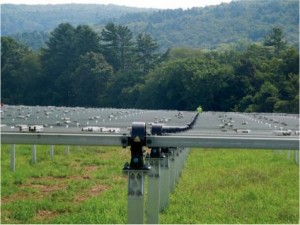
While Denison’s The Denisonian announced the university’s plans to begin building 6,000 solar panels this spring, sustainability efforts at Ohio Wesleyan will not include such a plan.
According to Peter Schantz, director of the physical plant for Buildings and Grounds, it takes two acres of land to generate two megawatts of electricity – land OWU doesn’t have.
“We’ve had several solar power providers approach us, tour our facilities and say we’re not viable,” Schantz said.
Schantz said an alternative way for OWU to save energy is to retrofit the buildings, which includes adding more energy-efficient lighting and energy-saving heating ventilation and air-conditioning. Though Schantz said finding money for such an endeavor is difficult, many of the recent building renovations help.
“Every time our donors give money to renovate, we improve the energy profile of those buildings,” he said.
Elliott Hall counts among one of the recently renovated buildings, while Merrick Hall is in the process of renovation. Schantz said the Small Living Units as well will be updated through the Student Housing Master Plan.
President Rock Jones said in an email that the university makes efforts to support sustainability in other ways as well, such as by working with Chartwells to provide more locally-sourced food, installing “Hydration Stations” to decrease bottled-water usage on campus and using partially-recycled paper for a “print green” program.
Additionally, Jones and Schantz said the campus and the City of Delaware have investigated the possibility of sharing land for solar panels, although finding a workable model has not yet happened.
Both Jones and Schantz said it’s important to see what other schools do to improve their environmental impacts, though the solutions won’t necessarily translate at OWU.
“Each campus is unique,” Jones said. “The size of the campus, the age of its buildings, its geographic location, and many other issues impact its sustainability. Denison, for example, was burning coal until very recently. Ohio Wesleyan converted its power plant in 1989.”
Schantz, who is involved in many of the sustainability initiatives on campus, said the focus should be on OWU’s opportunities.
“Keeping up with anyone else is a bad idea in any regard,” Schantz said. “This is an important pursuit and we need to be focusing on what we can do…how do we use our resources to reach our goals?”
